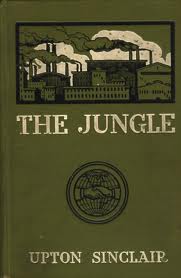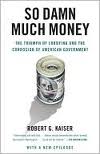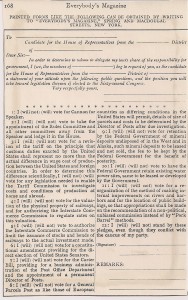My essay appearing in the Inquirer today had the narrow objective of placing Lincoln Steffens’ famous phrase, “Corrupt and Contented,” as it related to Philadelphia in the early 20th century. Clearly the phrase still resonates when applied to the city, but it has a broader resonance both for the early 20th century and our own time. Steffens’ article for McClure’s magazine represented an early contribution to what came to be called muckraking, a sustained reaction against the excesses of the Gilded Age. Although Steffens claimed that corruption in Philadelphia was worse than any other city he looked at, the problem of money corrupting public life was pervasive. Among the many reports to spill out over the early years of what we now identify as the Progressive Era, were Steffens’ fellow journalist Ida Tarbell’s damning report about the means by which Standard Oil managed to corner the market and Upton Sinclair’s expose of foul meatpacking practices and all the exploitation that lay behind it in The Jungle, published in  1906. These early exercises in investigative journalism captured public attention and helped spur a number of reforms, including Teddy Roosevelt’s various moves to break up trusts and national food and drug regulations that followed Sinclair’s reporting.
1906. These early exercises in investigative journalism captured public attention and helped spur a number of reforms, including Teddy Roosevelt’s various moves to break up trusts and national food and drug regulations that followed Sinclair’s reporting.
Many critical observers of the 1990s and early years of this century have identified a second Gilded Age, characterized both by material excesses and extensive corruption in and out of government. Many hoped there might be a second Progressive Era in response, and we can see some realization, however imperfect, of those expectations in efforts to rein in some of the excesses that brought about the current recession. Investigate journalism continues to play a role in this process, though the mediums through which such messages are delivered are vastly more complicated than they were a century ago. Two Yale 1964 classmates, both of whom got their start in journalism on the Yale Daily News, are contributing to public awareness of the problem. Bob Kaiser’s 2009 book, So Much Damn  Money, uses the life story of Washington lobbyist Gerald Cassidy to expose the larger picture of influence peddling in federal politics. A former managing editor of the Washington Post, Kaiser is currently finishing up a new book on how Congress operates by focusing on the Dodd-Frank regulations intended to regulate the financial industry. After his own stint as a managing editor, at the Wall Street Journal, Paul Steiger launched ProPublica in 2008 as an organization devoted to sustaining investigate journalism. Its mission—“To expose abuses of power and betrayals of the public trust by government, business, and other institutions, using the moral force of investigative journalism to spur reform through the sustained spotlighting of wrongdoing”—is intended to support, not replace the good work that traditional newspapers such as the Inquirer continue to do. To that end, ProPublica sends out daily “MuckRead” feeds to assure that news of malfeasance reaches the largest number of people possible.
Money, uses the life story of Washington lobbyist Gerald Cassidy to expose the larger picture of influence peddling in federal politics. A former managing editor of the Washington Post, Kaiser is currently finishing up a new book on how Congress operates by focusing on the Dodd-Frank regulations intended to regulate the financial industry. After his own stint as a managing editor, at the Wall Street Journal, Paul Steiger launched ProPublica in 2008 as an organization devoted to sustaining investigate journalism. Its mission—“To expose abuses of power and betrayals of the public trust by government, business, and other institutions, using the moral force of investigative journalism to spur reform through the sustained spotlighting of wrongdoing”—is intended to support, not replace the good work that traditional newspapers such as the Inquirer continue to do. To that end, ProPublica sends out daily “MuckRead” feeds to assure that news of malfeasance reaches the largest number of people possible.
Muckrakers like Steffens retained a benign faith in the power of public opinion to cleanse the system. Mass circulation magazines like McClure’s and Scribner’s, where many of the exposes appeared, routinely published forms for
their readers to send to their political representatives demanding reforms. No doubt, such efforts had some effect, in facilitating passage of the food and drug regulations, for example. It’s harder to say what power public opinion holds today. There is evidence, however, that accumulation of information that the generation of great wealth at the top of America’s income spectrum has been, like John Rockefeller’s path 100 years ago, paved all too often by irreputable if not illegal means, is having an effect. There is bound to be a political reaction. How informed and how focused it is will determine whether we can once again speak about a Progressive Era. The alternative, of public passivity because of the belief that the system is beyond repair, does not promise well for the future. One can hope, then, that even while corruption continues it not be said that we’re still contented.

I think it is important to point out that Philadelphia’s only relevant “days in the sunshine of reform and political transparaency” were from 1951 through 1968 after the reform Democrats took control of the city. Bear in mind it took investigating Grand Juries that began as early as 1937 to gather the evidence that led to trials and convictions (and 4 suicides) 10 years later.
The 1968 Democratic Primary was a fight over continuing self-oversight in governance and the formation of today’s pay-to-play and patronage system. We know who won that battle.